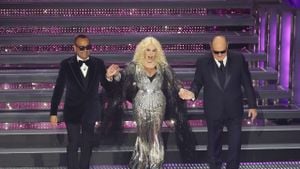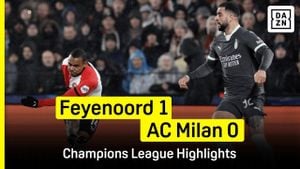The rivalry for the presidency of Les Républicains (LR) has officially begun, with Bruno Retailleau announcing his candidacy, igniting tension within the party. Retailleau, the current Minister of the Interior, declared his intentions to lead the party during the Wednesday broadcast of "On marche sur la tête," hosted by Cyril Hanouna, where political analyst Gauthier Le Bret remarked, "2027 has begun and the war is declared" between him and current LR president Laurent Wauquiez.
Retailleau has expressed his commitment to reshape the party and energize the right-wing camp leading up to the 2027 presidential elections. His letter to LR members emphasized his desire "to do for my party what I do at the head of my ministry: speak the truth and act quickly." This declaration was seen as cutting off Wauquiez, who anticipated corralling party support without opposition.
The origins of this conflict appear to stem from past discussions and implicit agreements about their roles within the LR. According to reports, during a private dinner on February 4, Wauquiez asked Retailleau to adhere to what he perceived was a mutual agreement for their political paths. He allegedly stated, "If you break this agreement, you will bear the responsibility for igniting a devastating chiefs' war." Wauquiez believed they had aligned roles: him rebuilding the party and Retailleau representing it at the governmental level.
While Wauquiez bides his time before officially announcing his candidacy, sources indicate he is poised to make his move soon. According to party insiders, his intention was to leave the field clear for himself, but Retailleau’s early declaration has shifted dynamics. Wauquiez's camp has expressed disappointment, claiming Retailleau's actions could lead to deep divisions within the party. "It is preferable for him to focus on his role at Beauvau; the France needs it," remarked Wauquiez's aides.
The internal battle is underscored by varying support and public opinion dynamics. Recent polls show Retailleau gaining traction, boasting up to 24% support, surpassing other potential candidates, including Wauquiez, who stands at 15%. His rise is attributed to recent successes and increased visibility, particularly as Minister of the Interior. Support for his leadership style stems not only from his experience but also from his perceived capability of bridging gaps within the right-wing electorate.
Retailleau embodies the modern right for many within his party, with supporters like Max Brisson stating, "Bruno Retailleau embodies the right today," highlighting his capabilities from both ministerial functions and party leadership roles. The positive reception from the public can be partly attributed to his recent political engagements, which have sparked renewed interest and enthusiasm for LR.
Yet, Wauquiez's allies fear the emergence of a "war of chiefs." They stress the need for unity rather than division, as reiterated by various party members. Concerns about retail politics disappearing to personal power struggles linger throughout discussions about the impending electoral process. The conflict is not merely procedural; it strikes at the heart of the party's continuing challenge to present itself as cohesive and formidable against rival movements.
Throughout their maneuvering, there's underlying anxiety about the potential disruption this rivalry might cause at the party level. While some members forecast potential struggles, others believe the competitive atmosphere might galvanize support and energy, potentially invigorate base engagement, and renew the party’s image.
Bruno Retailleau's early steps aim to consolidate his position and claim the narrative over party direction, attempting to showcase not just ambition but also responsiveness within the party's ranks. This effort is compounded by his poll success and deliberate framing as the forward-looking leader of the right.
Concluding, the upcoming LR leadership election looms as more than just a battle for position; it signifies broader ideological clashing and the possibilities for unification or fragmentation as the party seeks to navigate its future direction heading toward the 2027 presidential race. Observers and party members alike remain intrigued by how this internal rivalry will shape both the nature of campaigns and the overall health of Les Républicains as they deliberately rebuild and refocus their collective energies.



